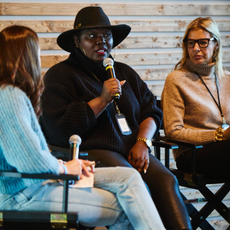
"I convinced my boss to send me to Russia"
NADIA LEONOVA, 28, MOSCOW
For five years I'd worked for Deloitte's financial advisory arm in Washington, D.C., conducting fraud investigations and doing forensic services. It sounds like CSI, but we just followed the money — investigating potential hires and suspected fraud, corruption, and money laundering. I'd been wondering how to advance my career when I took a business trip to our Moscow office. I speak Russian — I lived there until my teens. And when the company offered to transfer me there, I jumped at it. I'd recently broken up with a boyfriend, which I took as a kind of sign. Deloitte gave me a bonus to cover all my moving costs — real estate is incredibly expensive here — and it covers the occasional flight back home to D.C.
Emerging markets are sort of like the Wild West — there's always a lag before regulation and enforcement kick in, so it's easier for people to commit fraud. That may be bad for Russia's economy, but it's been pretty good for my career. When I arrived, the office had big news for me: There would be a restructuring, and as a result, I would be placed in charge of the whole team. I certainly didn't expect that I'd be running things! But I figured I might as well take the quote-unquote opportunity of a lifetime.
I learn new aspects of the job every day. It's like boot camp, but in the best sense. What I've learned in the three months since I started here would have taken years back in the States. I just wish I could get Internet access at home — I've been waiting to get hooked up for months. Customer service is a whole different ball game over here. —as told to Lauren Iannotti
MOVE IT OR LOSE IT Why you should reconsider relocation — from the Cubicle Coach, Marie Claire's HR guru.
It was easy to turn down your boss's offer to relocate when unemployment was at 4 percent. Today? Go west, young woman — or south, east, or north for that matter. Take it from the Coach: Unless you're a proven superstar, this is the time to go where you're needed. A few questions to ask first:
1. Do I get a salary bump to move from Hattiesburg to Hong Kong?
You don't need a huge raise, but be sure you don't end up making less because you're spending more on your dim sum and shoe habit.
Stay In The Know
Marie Claire email subscribers get intel on fashion and beauty trends, hot-off-the-press celebrity news, and more. Sign up here.
2. Will I be guaranteed employment for a prescribed length of time?
Get it in writing, ideally for a minimum of two years.
3. Will they pay for trips home, or for my family to come visit if they don't come along?
They should; it's cheaper than moving the whole brood.
4. How will HQ know I'm still around?
Establish a schedule for communication with the home office, and measurable goals to shoot for.
5. And if business goes south at home while I'm away?
Vet the new city and make sure it's healthy. It's one thing to hunt for a software job in northern California, quite another to be a laid-off condo broker in Miami.
"The markets plunged — so I had a baby"
ADELE ARKIN, 33, LONG BEACH, NY
I'd been on Wall Street for eight years doing human resources for firms like Lehman Brothers. I was working all the time. The company even sent me to London for three months right after I'd gotten married. And when I wasn't traveling, I was in the office till all hours, basically eating every meal there, going home only to sleep and shower. It was impossible for me to think about anything but the job.
I knew I needed to take a step back, so I decided to try my hand at real estate. It was a major lifestyle change. I wasn't getting a steady salary or big annual bonus checks — I made money off commissions and had to build my own client base. But it was so much more flexible. I made my own hours and worked from home most days. My husband and I were finally able to enjoy dinner together. Even when the real-estate market slowed down, I wasn't freaked out about it. I saw it coming and prepared for it, learning to live on a budget and save more.
That's about the time we decided to start our family. Before, I was too stressed out to get pregnant. But reinventing myself has allowed me to relax and enjoy my life more. My husband and I agreed it wasn't worth waiting just to add another zero to our bank account — and our daughter, Maya, was born in September 2006. To stay in shape, I started a branch of Stroller Strides in my town — we're a bunch of moms who work out together with our kids in tow. I live such a healthier, more balanced lifestyle now. —as told to Lea Goldman
BRINGING UP BABY How to get ahead during your pregnant pause.
More than half of all new moms hustle back to work by the sixth month after their child's birth, according to the Census Bureau. But with everyone's job security suddenly tenuous and your career at a standstill, we have to ask: What's the rush? If you want (and can afford) to take extra time off to raise your newborn, do it. We asked Amy Keroes, founder of MommyTrackd.com, how to stay in the game even while temporarily sidelined:
Be a nudge.
Periodically call supervisors and colleagues and get up to speed. Some women even request that they be CCed on important e-mails while they're out.
Friend everyone.
Remind contacts that you're alive and well by pinging them on Facebook or LinkedIn. If you're not already a member, step away from this magazine and sign up now.
Freelance.
Not only will freelancing keep your skills sharp — and earn you a solid paycheck — but it fills any worrisome gaps in your résumé.
Take a class.
Yes, it's a time commitment, but enrolling in a course demonstrates killer devotion. The hard truth: Some employers may need to see this kind of bootstrapping before hiring someone fresh off the mommy track.
Schedule playdates — for you.
Meet up with colleagues for lunch or drinks. It'll force you out of those drool-stained sweatpants and score you the latest office dish. You'll feel less isolated once it's time to get back to work.

"I dumped a great job to get my MFA"
CAROLYN KELLOGG, 41, LOS ANGELES
I used to be a Web producer for a huge foundation. I dressed like a banker — had my nails done and my tame hair color touched up each month — because we never knew who'd walk in. (I once saw Michael Eisner in the hallway!) I loved my boss and that we were helping the community. But I was sick of looking at the gray carpeting. Each day I'd pick up the same Starbucks and take the same elevator and stare at that hideous carpet. So I decided to go back to school for a Master of Fine Arts in creative writing.
I broke up with my boyfriend, packed up my stuff, and drove to the University of Pittsburgh. I planned to pay for school with loans and a teaching fellowship, and I even cashed out my 401(k) — there's no penalty if you use it for education. It would all but wipe me out, but I figured I'd come out standing up.
It was crazy liberating being with people who hadn't been indoctrinated into the 9-to-5 culture. And the work was fabulous — all that reading and sitting around talking about books. I remember being in a workshop at my program director's house and realizing I was learning from the guy who taught Michael Chabon, and the professor's wife was Raymond Carver's ex-mistress, and people were grabbing beers from the fridge and talking about my work. I loved it.
I'm back in L.A. now, freelancing for the L.A. Times and polishing up my novel. I feel some pressure to look for something safe and salaried, but I'm trying to stick it out. I'm making much less than I was before, but it's worth it just to be able to write for a living — and to dye my hair a ridiculous shade of red and not worry about offending anyone but the guy who works at the coffee shop down the street. —as told to Lauren Iannotti
SHOULD YOU GO BACK TO SCHOOL? It's not as costly or time-consuming as you think.
An advanced degree doesn't come cheap, but it's worth it in the long run, says Lisa Heidman of executive search firm Bedford Consulting Group. The numbers back her up:
PAY NOW, PAYOUT LATER
Average college grad earns: $42K
Average master's grad earns: $52K
Average Ph.D. grad earns: $71K
Average professional (e.g., doctor or lawyer) earns: $82K
LET THE BOSS PICK UP THE TAB
Roughly half of all U.S. workers were eligible for tuition benefits from their employers last year.
KEEP YOUR DAY JOB
Only 36 percent of all master's students and 61 percent of doctoral students go full-time.
MINIMIZE THE STICKER SHOCK
Check out petersons.com/finaid to get your hands on some of the $1 billion in graduate-school scholarships. —Jihan Thompson
"I took a three-month sabbatical to recharge my batteries"
MEGAN LANGER, 29, PORTLAND, OR
I'm a media-relations manager at Intel. The company is unique in that every seven years, you're entitled to take an eight-week paid sabbatical. I had another three weeks of vacation owed me, so it amounted to a hefty chunk of time. It turned out to be perfect timing — my husband was about to start a new business, so he could take a few months off and join me. We figured this would be our last hurrah before having kids.
But I admit I had some reservations. For starters, you feel like you have to cram a year's worth of work into nine months, which can be stressful. Every year we have a big annual review that highlights our achievements. I worried that I'd miss out on three months of opportunities, specifically because Intel was preparing to make some announcements that I'd normally oversee. I had to tell myself, "It's okay, Megan. There will be other projects to manage."
I handed over my responsibilities to someone else, and my e-mail account became inactive. I was completely separated from the office, which was weird at first. But I made a conscious decision not to check in, otherwise I'd have thought about work nonstop.
My husband and I spent the first six weeks living in a camper. We went fly-fishing in Colorado and hiking in Utah's Zion National Park. Then we hopped on a plane to Hawaii, where we toured volcanoes and rain forests. The market crashed while we were gone. It was pretty scary, not knowing whether your job would be there when you got back. My husband and I spent a lot of time talking about it and realized we can't control the economy, so there's no point in dwelling on it. Being away gave me perspective. This too shall pass. And if it doesn't, well, I can always go back to living in a camper — it's actually kind of fun. —as told to Lea Goldman
IS IT CAREER SUICIDE? Hardly — an extended leave may save your job.
Though only 6 percent of blue chips (like Nike and AmEx) offer paid sabbaticals, unpaid leaves are becoming popular as firms look to cut costs while retaining top talent. Here's how it works: You forgo your paycheck during the sabbatical, which can run upwards of six months. In exchange, you get benefits and a written commitment to return to your gig once the sabbatical is over. "Hiring a replacement costs as much as three times the average worker's salary," explains Elizabeth Pagano, founder of yoursabbatical.com. "It makes more financial sense for a company to bring a loyal employee back than to find a new one."
"I got laid off — and went globe-trotting"
SANA AMANAT, 26, NEW YORK CITY
I had the coolest job ever — editing comic books. I worked with some of the most creative and talented writers and artists. Then in August, without any notice, a bunch of us were laid off. This wasn't the first time that's happened to me. Not long after I graduated college, I worked at a startup magazine in New York that folded two months after I got there. I tried freelancing but could barely make ends meet. The whole period was a black hole.
When I got laid off this time around, my mind-set was completely different. I said, "I'm not sticking around here just to get depressed. I'm going to use this as an opportunity to clear my head." So I sublet my apartment and flew to Dubai, where my brother lives. From there, I flew to Thailand, and then met up with friends in Mumbai.
Now I'm back in Dubai. I'm lucky in that I'm here rent-free, paying for food and travel with the money I get from subletting my apartment. Every day I work out, then go to the pool and read. It occurred to me — I was an editor and didn't have time to read books! Now and again, I check out job listings. If an opportunity comes along that feels right, I'll grab it. Till then, though, there's nothing wrong with taking time off. I've got the rest of my life to work. —as told to Lea Goldman
ALL ABROAD! Hit the road to one of these top cities for job-hungry expats.
There are still plenty of lucrative jobs to be had overseas. We asked Gary Parker, founder of Executive Resources Ltd., a consulting firm for companies looking to hire internationally, where lady expats can find the best gigs these days:
Singapore: A research outpost for Yankee blue chips like Cisco and Eli Lilly. Average expat salary: $250K.
In need of: High-tech, pharma, PR pros
Dubai: Still awash in oil money. Average expat salary: $270K.
In need of: Hotel managers, industrial engineers, oil execs, architects
Hong Kong: Asia's financial epicenter still enjoys big business from mainland China. Average expat salary: $300K.
In need of: Lawyers, financial analysts
"I decided to run for office"
MONISHA MERCHANT, 31, LAKEWOOD, CO
Out here in Denver, we're all about the work/life balance. As a product manager for a telecom provider, I'm at the office from 7:30 to 5:30. I love my job — talking to engineers, working with clients. But I'm also passionate about community service, thanks to my parents, who grew up in India and earned government grants to come here for college. They instilled in me and my brother the idea of giving back. That's why I've always been politically active.
So when a Democratic candidate for the University of Colorado Board of Regents dropped out of the race, I decided to run for his seat. My mom was my campaign manager, and I recruited contacts I'd made as a Hillary Clinton volunteer during the primaries. My team was amazing — knocking on doors, working the phones, holding signs for me in the frigid cold on Election Day. And even my brother's friends gave me money! In all, I raised $25,000.
Campaigning was a huge time commitment. I'd be up at 3 a.m. weekdays, writing speeches, preparing "robo call" lists. Then back at it after work. My boss was supportive, probably because my commitment to my job never flagged. But I did use all of my vacation days to campaign.
When I won, I was elated. Most big state universities have a regents board, and ours is pretty influential. I help shape policy for the college system, advocating for federal research dollars, seeking state funding to make our students competitive in the green economy. I'm grateful for the chance to do such important work. And, someday, well, U.S. senator seems like the coolest job to me. Working with a small group of people to affect national issues and foreign policy? That just sounds like the most fun, intellectually fulfilling work on the planet. —as told to Lauren Iannotti
RUN LIKE A GIRL How to break into politics — from Faith Winter of the White House Project, a nonprofit that helps prepare women for office.
Start by volunteering.
Work pro bono for a city council member. "She's voting on sewer lines and dog parks. Any research help she can get is invaluable," Winter says. You can also sign up with a campaign or run for a municipal board. "My town has 17 all-volunteer boards that advise the city council," says Winter. "They're a great way to make a name for yourself."
Join the party.
Local Democrats and Republicans are always looking for new people to run for office. "We don't need a bunch of lawyers making policy; we need teachers, nurses, nonprofit workers," says Winter. "Find your party's Website. Go to a potluck. Bring some chili and ask how you can help."
Take a course.
"It's a good idea to do some training, to get the confidence to run, and to learn skills like raising money and crafting a compelling message," says Winter. To find a program in your area, visit thewhitehouseproject.org. But remember, you can't learn everything in a class. Eventually you just have to take that leap.
-
 All the Easter Eggs and Name Drops on Taylor Swift's 'The Tortured Poets Department,' Explained
All the Easter Eggs and Name Drops on Taylor Swift's 'The Tortured Poets Department,' ExplainedDigging through the fan theories so you don't have to.
By Quinci LeGardye Published
-
 This Week's Best On-Sale Picks Include a Tory Burch Bag and Pretty Silver Ballet Flats
This Week's Best On-Sale Picks Include a Tory Burch Bag and Pretty Silver Ballet FlatsWarm weather is finally here—it's time to dress like it.
By Brooke Knappenberger Published
-
 A Sporty It-Sneaker Era Is About to Begin
A Sporty It-Sneaker Era Is About to BeginNike's next Air models are designed for Olympic athletes, but they'll soon be all over street style.
By Halie LeSavage Published
-
 Peloton’s Selena Samuela on Turning Tragedy Into Strength
Peloton’s Selena Samuela on Turning Tragedy Into StrengthBefore becoming a powerhouse cycling instructor, Selena Samuela was an immigrant trying to adjust to new environments and new versions of herself.
By Emily Tisch Sussman Published
-
 This Mutual Fund Firm Is Helping to Create a More Sustainable Future
This Mutual Fund Firm Is Helping to Create a More Sustainable FutureAmy Domini and her firm, Domini Impact Investments LLC, are inspiring a greater and greener world—one investor at a time.
By Sponsored Published
-
 Power Players Build on Success
Power Players Build on Success"The New Normal" left some brands stronger than ever. We asked then what lies ahead.
By Maria Ricapito Published
-
 Don't Stress! You Can Get in Good Shape Money-wise
Don't Stress! You Can Get in Good Shape Money-wiseYes, maybe you eat paleo and have mastered crow pose, but do you practice financial wellness?
By Sallie Krawcheck Published
-
 The Book Club Revolution
The Book Club RevolutionLots of women are voracious readers. Other women are capitalizing on that.
By Lily Herman Published
-
 The Future of Women and Work
The Future of Women and WorkThe pandemic has completely upended how we do our jobs. This is Marie Claire's guide to navigating your career in a COVID-19 world.
By Megan DiTrolio Published
-
 Black-Owned Coworking Spaces Are Providing a Safe Haven for POC
Black-Owned Coworking Spaces Are Providing a Safe Haven for POCFor people of color, many of whom prefer to WFH, inclusive coworking spaces don't just offer a place to work—they cultivate community.
By Megan DiTrolio Published
-
 Where Did All My Work Friends Go?
Where Did All My Work Friends Go?The pandemic has forced our work friendships to evolve. Will they ever be the same?
By Rachel Epstein Published